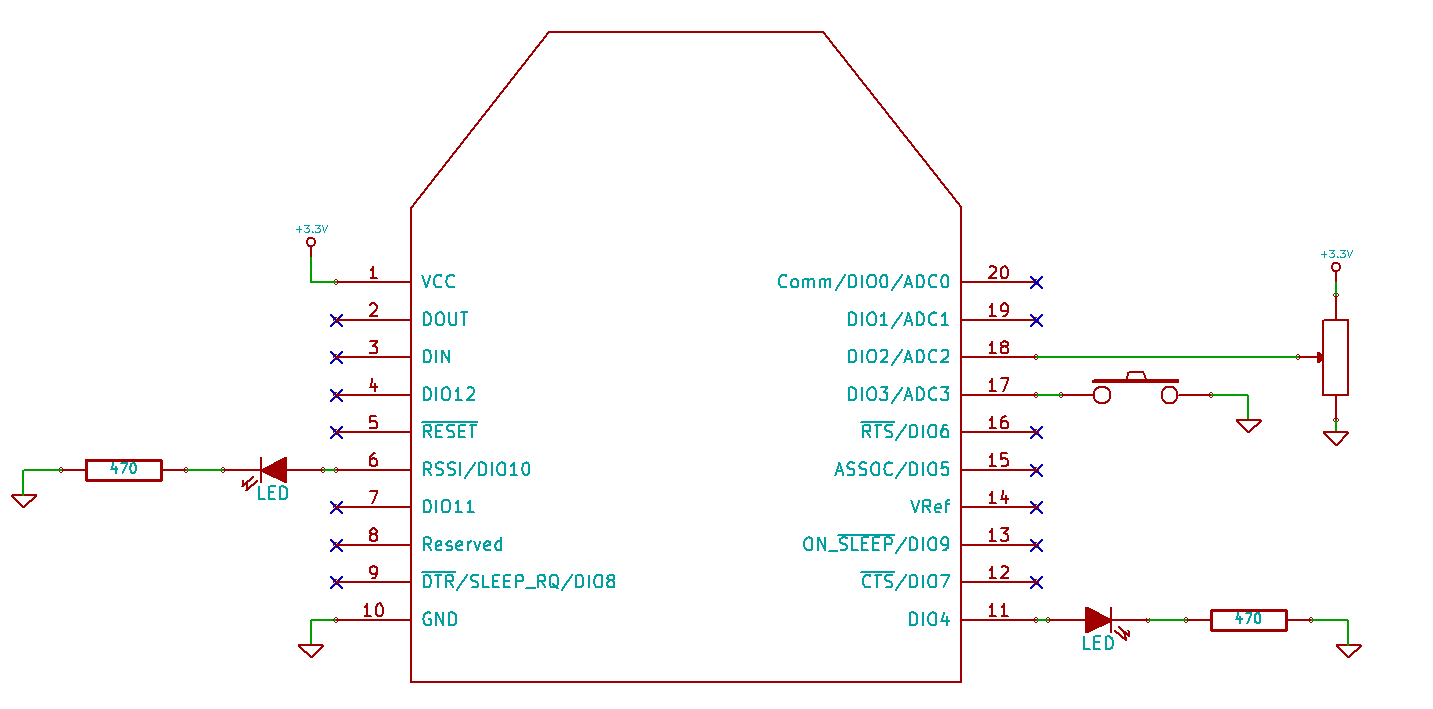802.15.4 IO Sampling Callback example for mbed XBeeLib By Digi
This example shows how to monitor remote XBee modules DigitalInputs and ADCs. The remote XBee module sends packets periodically to the local XBee module containing the value of its DigitalInputs and ADCs. This library process those packets and calls a user registered function callback so the user can handle them.
See Handling IO Data Samples from other modules chapter for more information.
Common Setup
Make sure you have a valid Example Common Setup
Example Setup
Application
You have to configure the remote device 64-bit address by customizing the REMOTE_NODE_ADDR64_MSB and REMOTE_NODE_ADDR64_LSB defines with the remote XBee module 64-bit address.
Hardware
On the Remote XBee module, wire following peripherals to the pins specified on the table and schematics, or change the application pins according to your hardware setup:
| Line | Pin | Value |
|---|---|---|
| DIO2/ADC2 | 18 | ADC (Analog Input) |
| DIO3/ADC3 | 17 | Digital Input |

Running the example
Build and deploy the example to the mbed module.
Reset the mbed module so the example starts. You should see the example debug information through the debug interface configured in the 'Local Setup' chapter.
The application will do following operations:
- Register the function callback that will be called by the library when corresponding IO sample frame is received.
- Configure the remote XBee module pins according to the table above.
- Configure the sample rate.
- Configure remote XBee module to send IO Samples to local XBee module
- Periodically ask the XBee library to process received frames
When a IO Sample frame is received the user callback does:
- Read DIO3_AD3 digital value
- Read DIO2_AD2 analog value
main.cpp
- Committer:
- hbujanda
- Date:
- 2016-07-29
- Revision:
- 10:1584fb379965
- Parent:
- 9:7aeb107dd28e
File content as of revision 10:1584fb379965:
/**
* Copyright (c) 2015 Digi International Inc.,
* All rights not expressly granted are reserved.
*
* This Source Code Form is subject to the terms of the Mozilla Public
* License, v. 2.0. If a copy of the MPL was not distributed with this file,
* You can obtain one at http://mozilla.org/MPL/2.0/.
*
* Digi International Inc. 11001 Bren Road East, Minnetonka, MN 55343
* =======================================================================
*/
#include "mbed.h"
#include "XBeeLib.h"
#if defined(ENABLE_LOGGING)
#include "DigiLoggerMbedSerial.h"
using namespace DigiLog;
#endif
#define REMOTE_NODE_ADDR64_MSB ((uint32_t)0x0013A200)
#error "Replace next define with the LSB of the remote module's 64-bit address (SL parameter)"
#define REMOTE_NODE_ADDR64_LSB ((uint32_t)0x01234567)
#define REMOTE_NODE_ADDR64 UINT64(REMOTE_NODE_ADDR64_MSB, REMOTE_NODE_ADDR64_LSB)
using namespace XBeeLib;
Serial *log_serial;
static void io_data_cb(const RemoteXBee802& remote, const IOSample802& sample_data)
{
if (remote.is_valid_addr16b()) {
log_serial->printf("\r\nGot a 16-bit IO Sample Data [%04x]\r\n", remote.get_addr16());
} else {
const uint64_t remote_addr64 = remote.get_addr64();
log_serial->printf("\r\nGot a 64-bit IO Sample Data [%08x:%08x]\r\n", UINT64_HI32(remote_addr64), UINT64_LO32(remote_addr64));
}
RadioStatus radioStatus;
DioVal dio3;
radioStatus = sample_data.get_dio(XBee802::DIO3_AD3, &dio3);
if (radioStatus != Success) {
log_serial->printf("sample_data.get_dio(XBee802::DIO3_AD3, &dio3) FAILED\r\n");
} else {
log_serial->printf("DIO3 Digital value %d\r\n", dio3);
}
uint16_t ad2;
radioStatus = sample_data.get_adc(XBee802::DIO2_AD2, &ad2);
if (radioStatus != Success) {
log_serial->printf("sample_data.get_adc(XBee802::DIO2_AD2, &ad2) FAILED\r\n");
} else {
log_serial->printf("AD2 Analog value %04x\r\n", ad2);
}
}
int main()
{
log_serial = new Serial(DEBUG_TX, DEBUG_RX);
log_serial->baud(9600);
log_serial->printf("Sample application to demo how to receive IO Sample Data from a RemoteXBee802 Node\r\n\r\n");
log_serial->printf(XB_LIB_BANNER);
#if defined(ENABLE_LOGGING)
new DigiLoggerMbedSerial(log_serial, LogLevelInfo);
#endif
XBee802 xbee = XBee802(RADIO_TX, RADIO_RX, RADIO_RESET, NC, NC, 9600);
/* Register callback */
xbee.register_io_sample_cb(&io_data_cb);
RadioStatus radioStatus;
radioStatus = xbee.init();
MBED_ASSERT(radioStatus == Success);
const RemoteXBee802 remoteDevice = RemoteXBee802(REMOTE_NODE_ADDR64);
log_serial->printf("Configuring remote Device (%08X:%08X) DIO3_AD3 as Input and DIO2_AD2 as ADC\r\n", REMOTE_NODE_ADDR64_MSB, REMOTE_NODE_ADDR64_LSB);
radioStatus = xbee.set_pin_config(remoteDevice, XBee802::DIO3_AD3, DigitalInput);
MBED_ASSERT(radioStatus == Success);
log_serial->printf("Enabling remote Device (%08X:%08X) internal Pull-up resistor on DIO3_AD3\r\n", REMOTE_NODE_ADDR64_MSB, REMOTE_NODE_ADDR64_LSB);
radioStatus = xbee.set_pin_pull_up(remoteDevice, XBee802::DIO3_AD3, true);
MBED_ASSERT(radioStatus == Success);
radioStatus = xbee.set_pin_config(remoteDevice, XBee802::DIO2_AD2, Adc);
MBED_ASSERT(radioStatus == Success);
log_serial->printf("Configuring remote Device (%08X:%08X) to send samples every 5 seconds\r\n", REMOTE_NODE_ADDR64_MSB, REMOTE_NODE_ADDR64_LSB);
xbee.set_io_sample_rate(remoteDevice, 5.0);
log_serial->printf("Configuring remote Device (%08X:%08X) to send samples to this device\r\n", REMOTE_NODE_ADDR64_MSB, REMOTE_NODE_ADDR64_LSB);
const uint64_t localAddr = xbee.get_addr64();
xbee.config_io_sample_destination(remoteDevice, localAddr);
while (true) {
xbee.process_rx_frames();
wait_ms(100);
log_serial->printf(".");
}
delete(log_serial);
}
 Digi International Inc.
Digi International Inc.